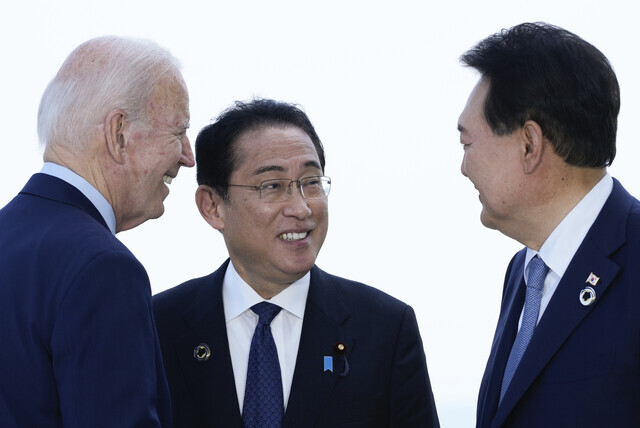hankyoreh
Links to other country sites 다른 나라 사이트 링크
[Reporter’s notebook] Did playing favorites with US, Japan fail to earn Yoon a G7 summit invite?

Trouble is brewing after news broke on Friday that President Yoon Suk-yeol was not invited to the Group of Seven (G7) summit meeting this year, which is scheduled to take place on June 13-15 in Fasano, Italy.
Korea’s main opposition parties, the Democratic Party and the Rebuilding Korea Party, have released written scathing statements criticizing the turn of events, while the presidential office and Foreign Ministry have released explanations in an attempt to downplay the situation.
While the opposition and ruling camps often clash over the direction of foreign policy and inter-Korean policy, they have never come to blows over South Korea’s participation in the G7 summits until now. The fact that the presidential office and the Foreign Ministry released their explanations for this turn of events at 10 pm on a Saturday demonstrates the sensitivity of this issue.
“The invitees to the G7 Summit have been selected each year based on the agenda of interest of the host country. This year’s host country, Italy, is focused on African and Mediterranean issues related to internal migration issues,” the government said, adding that “in the case of France in 2011, Germany in 2015, and Italy in 2017, all the invitees were African countries."
Italy, the host country for 2024’s gathering of the wealthy democratic countries, has not officially announced the list of countries that have been invited. Reuter’s report stating that Italy is planning to invite leaders from Tunisia, Kenya, Algeria, and South Africa lends credence to the presidential office’s explanation.
However, Yoon's administration ignored the fact that the Italian government also plans to invite countries outside Africa and the Mediterranean, such as India, Brazil and Argentina.
This explains why some sharp comments were made, as can be seen in Democratic Party spokesperson Kang Sun-woo’s written commentary, in which she wrote that the government was making “lame, pathetic excuses.”
South Korea does not have a long history of attending the summits of the G7 — a forum consisting of the US, UK, France, Germany, Canada, Italy and Japan, also dubbed as a clique for developed nations. South Korea’s first experience with the G7 summit came in 2020, when then-host, US President Donald Trump, invited former President Moon Jae-in to the summit, as Trump wanted to expand the G7 into the G11 or the G12.
In 2021, then-UK Prime Minister Boris Johnson, who was the host for that year’s summit, also invited Moon. German Chancellor Olaf Scholz, who chaired the 48th meeting on June 26-28, 2022, shortly after Yoon took office, did not invite the South Korean president, while Japanese Prime Minister Fumio Kishida, the 2023 chair, did.
To summarize, ever since South Korea first crossed the G7 summit’s threshold in 2020, South Korea has not been invited two times out of five — first in 2022 and second in 2024. Coincidentally, both years overlap with Yoon’s time as president.
While South Korea has been invited intermittently since Yoon took office, India has consistently found its name on the guest list. Even if we take the opposition’s criticism that South Korea’s diplomatic opportunities have “drastically shrunk” because the country has adopted a “one-sided diplomatic strategy centered around the US and Japan” (comments from Kim Jun-hyung, lawmaker-elect of the Rebuilding Korea Party) with a grain of salt, would it really be taking it too far to say that there’s sense disgruntlement with Yoon’s parading of “values diplomacy” while only having eyes for the US and Japan?
By Lee Je-hun, senior staff writer
Please direct questions or comments to [english@hani.co.kr]

Editorial・opinion
![[Editorial] Penalties for airing allegations against Korea’s first lady endanger free press [Editorial] Penalties for airing allegations against Korea’s first lady endanger free press](https://flexible.img.hani.co.kr/flexible/normal/500/300/imgdb/original/2024/0502/1817146398095106.jpg) [Editorial] Penalties for airing allegations against Korea’s first lady endanger free press
[Editorial] Penalties for airing allegations against Korea’s first lady endanger free press![[Editorial] Yoon must halt procurement of SM-3 interceptor missiles [Editorial] Yoon must halt procurement of SM-3 interceptor missiles](https://flexible.img.hani.co.kr/flexible/normal/500/300/imgdb/child/2024/0501/17145495551605_1717145495195344.jpg) [Editorial] Yoon must halt procurement of SM-3 interceptor missiles
[Editorial] Yoon must halt procurement of SM-3 interceptor missiles- [Guest essay] Maybe Korea’s rapid population decline is an opportunity, not a crisis
- [Column] Can Yoon steer diplomacy with Russia, China back on track?
- [Column] Season 2 of special prosecutor probe may be coming to Korea soon
- [Column] Park Geun-hye déjà vu in Yoon Suk-yeol
- [Editorial] New weight of N. Korea’s nuclear threats makes dialogue all the more urgent
- [Guest essay] The real reason Korea’s new right wants to dub Rhee a founding father
- [Column] ‘Choson’: Is it time we start referring to N. Korea in its own terms?
- [Editorial] Japan’s rewriting of history with Korea has gone too far
Most viewed articles
- 160% of young Koreans see no need to have kids after marriage
- 2Presidential office warns of veto in response to opposition passing special counsel probe act
- 3[Editorial] Penalties for airing allegations against Korea’s first lady endanger free press
- 4Months and months of overdue wages are pushing migrant workers in Korea into debt
- 5Hybe-Ador dispute shines light on pervasive issues behind K-pop’s tidy facade
- 6Japan says it’s not pressuring Naver to sell Line, but Korean insiders say otherwise
- 7[Reporter’s notebook] In Min’s world, she’s the artist — and NewJeans is her art
- 8Inside the law for a special counsel probe over a Korean Marine’s death
- 9At heart of West’s handwringing over Chinese ‘overcapacity,’ a battle to lead key future industries
- 10OECD upgrades Korea’s growth forecast from 2.2% to 2.6%